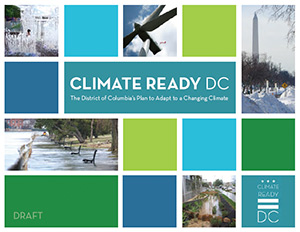 from the Climate Ready DC draft report
from the Climate Ready DC draft report
Cities across the country and around the globe are recognizing their responsibility to prepare for a changing climate, and the District of Columbia is no exception. In recent years, we have seen how climate change is already impacting us with recordbreaking heat waves, flooding caused by rising sea levels and heavy rains, and the destructive 2012 derecho storm. These events are sobering reminders that without action, increasingly severe weather events will threaten to disrupt our power grid, harm our economy, and cost lives.
Recognizing the need to prepare and adapt, the Sustainable DC Plan established a goal to make the District more resilient to future climate change. Climate Ready DC is the District’s strategy for achieving this goal while helping to ensure that our city continues to grow greener, healthier, and more livable.
Purpose
For the last two years, various stakeholders and the District government—led by the Department of Energy and Environment (DOEE)—have been working with a team of technical experts to develop Climate Ready DC. This plan identifies the impacts that a changing climate will have on the District; the risks to our infrastructure, public facilities, and neighborhoods; and the actions we must take now and in the future to prepare. It is based on the best available climate science and was developed through consultation with leading experts within and outside of the District government.
View the draft Climate Ready DC online.




